











| USPS Learning Guides Learning Guides are available
to members and the public at various marine supply stores, and also
directly from United States Power Squadrons® Headquarters by calling
1-888-FOR-USPS between 8:30AM and 4:00PM ET Monday through Friday.
Prices range from $6.95 - $16.95 for books and $24.95 for CD-ROMs.
|
|
Amateur
Radio
Where you do your boating dictates the radios you need. Should you add Ham radio to your VHF/FM or single side-band (SSB) equipment? Here's a quick guide to Ham radio's pros and cons, FCC regulations, and how to obtain your license. For information on the USPS/CPS Amateur Radio Net, click here. |
|
Boat
Insurance Do you really know what marine losses are covered by your insurance policy? Don't be blind-sided by exceptions that come to your attention only after you suffer a loss. Know what you're buying. Here is what you need to know when you shop for boat insurance. |
|
Compass
Adjusting Can you trust your compass? Will it guide you home safely? Maybe, if it's properly adjusted. If not, it may give you a false sense of security and actually lead you into danger. Don't take chances. Here are the instructions for accurately adjusting your compass. |
|
Global
Positioning System If you don’t own a GPS unit now, you probably will soon. Everybody's using GPS: boaters, hunters, anglers, commercial ship operators, drivers, and Co-op Charting enthusiasts. Determine your exact position anywhere on earth and plan the next leg of your journey. Here's a step-by-step guide that's easy to read and understand. |
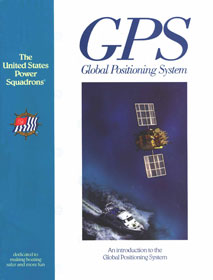 |
How
to Fly Flags |
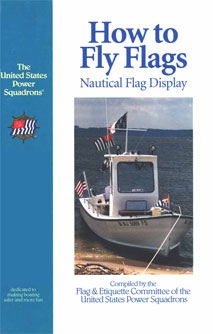 |
Introduction
to Sailing Ever wonder how a sailboat moves into the wind? Why some sailboats are faster than others? The basics of sailboat handling and performance are here in easy-to-understand language that will pique your curiosity and make you eager to set sail soon. |
|
Knots,
Bends and Hitches (Marlinespike) Real seamen use proper lines and knots and know why certain ropes are dangerous for some uses aboard boats. Here's your guide to these skills, including easy-to-follow diagrams that show you how to tie the best knots and splices for every job. |
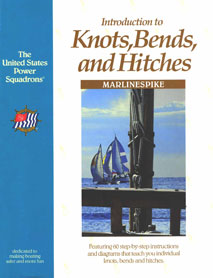 |
Basic
Knots CD-ROM In cooperation with Beutner Multimedia, USPS now has three CDs available that effectively demonstrate marlinespike techniques. The Basic Knot CD is packaged with two different color pieces of light nylon line that help show when a knot (like the square knot) is correctly tied. Learn to tie 21 basic knots with this easy-to-use CD-ROM interactive reference. High quality video shows each and every step clearly. Knots demonstrated include the Square Knot or Reef Knot, Figure Eight, Bowline, Round Turn, Half Hitch and more. The demonstrations are well done and will be a terrific addition to your marlinespike reference library. |
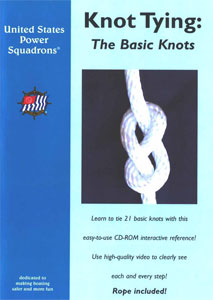 |
Advanced
Knots CD-ROM Learn to tie 20 advanced knots with this easy-to-use CD-ROM interactive reference. Knots demonstrated include Figure Eight Coil, Pile Hitch, Timber Hitch, Turks Head, and more. |
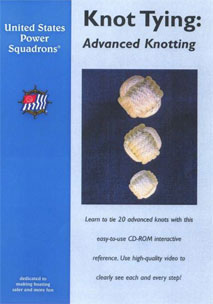 |
Splicing
Three-Strand Line CD-ROM Learn to splice three-strand line with this easy-to-use CD-ROM interactive reference. Splices demonstrated include the Back Splice, Eye Splice, Short Splice and more. |
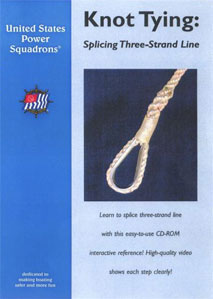 |
Nautical
Glossary You're reading an interesting book about boating and come across a new word or phrase. Where do you find the correct definition? This handy reference provides the definitions of over 1300 nautical words and phrases used by boaters, including those found in USPS courses and publications. It's easy to read and worth keeping handy. |
|
Introduction
to Navigational Astronomy Every mariner who ever put to sea has marveled at the millions of tiny lights in the night sky. Can they guide your passage? See what early sailors saw, share their wonders, dream their dreams, all with the help of this fun-packed, non-technical guide to stars, planets, and major constellations of the Northern Hemisphere. |
|
Oceanography You usually can’t see them, but things happen in and under the oceans every day that affect your life. This non-technical guide to marine geography, earth crusts and plates, ocean chemistry, effects of weather, tides, currents, and wave formation will bring you hours of enjoyment. |
|
Plotting
and Labeling Standards How do you move your boat from here to there? Via the safest route? In the least time? With accurate, consistent, and rock-solid knowledge of your position? And, how can you reconstruct and repeat your passage, or tell the oncoming watch the course to steer, speed to make, and bearings to take? Plotting and labeling your course using standard symbols, labels, and abbreviations is the way to go. In easy-to-understand form, here they are and how to use them. |
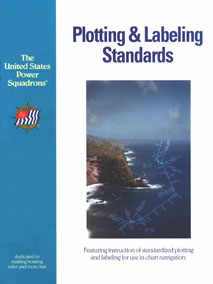 |
Predicted
Log Contest How does your boat handle and perform? Nobody knows better than you do, if you know how fast it travels at various engine/propeller speeds under different conditions. Predicted log contests pit your knowledge and skippering skills against the clock. How closely can you pre-determine the time it will take to travel each leg of a course? Competing against yourself and comparing your skills to those of other boaters, this fun competition hones your boat-handling skills. |
|
Sight
Reduction Methods Celestial navigation using the sun, moon, stars, and planets to plot your position and course is still a vital skill for every ocean-going yachtsman, even in this day of GPS navigation. Here is a guide to five important methods for converting your observations into the meaningful data that tells you exactly where you are. |
|
Skipper
Saver Note: This Learning Guide is no longer available. Skipper Saver has been replaced with the Partner in Comand Seminar. |
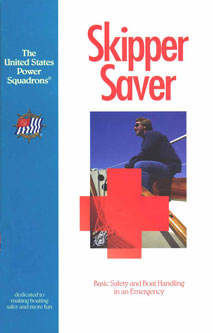 |
Water
Sports Boating is fun, but there’s a lot more you can do on the water! Like skiing and windsurfing, to name a few. But, even these have safety rules, special equipment, procedures, and hand signals. Some seem so basic that it’s hard to find them in writing, but it’s important to know them to enjoy these sports safely. Here they are, in a booklet ready for use by long-time enthusiasts and beginners alike! |
|
Advanced
Grades
Elective Courses
Seminars
Learning Guides
Educational Calendar
Course Calendar
